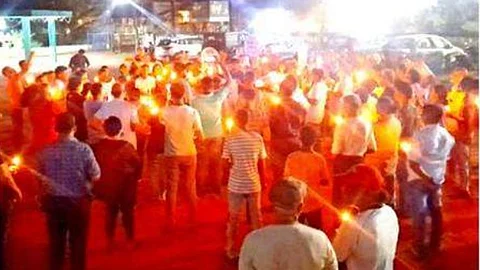

The High Court of Bombay at Goa, comprising Justices Bharati Dangre and Nivedita P Mehta, has disposed of Contempt Petition 12 of 2023 on noise pollution in Anjuna and Vagator. While refraining from penal action, the bench sent a clear message to the Goa government and tourism stakeholders: the health of local residents cannot be compromised to entertain tourists.
The petition, which began on July 7, 2023, was concluded on Wednesday, with the court choosing to take the advisory route. The judges urged stakeholders to file a compliance report by October 31, 2025, emphasising the need for enforcement and education.
“In Goa, everyone thinks life starts after 10 pm. Every shack can be heard blasting music even after 12 O’clock to woo tourists. That’s the problem and it can be solved if establishments playing music in the open, start educating the guests that come in that, music above permissible decibel will not be played,” observed Justice Dangre.
She further directed: “Whichever establishment plays amplified music in open air shall display a warning of the maximum sound decibel permitted to be played at the entrance.”
The court took note of the disturbance caused by loud music to Xavier Retreat House in Baga, where spiritual retreats are held. “Some shacks catering to tourists in Baga beach, near where the retreat is held, are disturbing the serenity of the retreats and it defeats the purpose. Their grievance is that the Noise Monitoring Committee (NMC) of the area is not activated. We direct the State to activate the NMC in the area and to conduct surprise and regular checks,” stated Justice Dangre.
The hearing commenced with Goa State Pollution Control Board (GSPCB) counsel Manish Salkar referencing submissions from Amicus Curiae Nigel da Costa Frias (O Heraldo, July 18, 2025), which included a direction to ensure that all open-air venues install and maintain online noise monitoring systems.
Salkar assured the court that GSPCB would begin mapping venues, particularly where multiple establishments are located close to each other, to ensure individualised monitoring and accountability.
“All establishments that play music till 10 pm near residential areas will have to install the noise monitoring systems connected,” affirmed Salkar.
The court reiterated the issue of late-night music being normalised: “The problem is that in Goa, all tourists think that parties start after 10 pm. This misinformation must stop because all citizens have the right to sleep and live without noise,” said Justice Dangre.
Petitioner Desmond Alvares flagged cases where some establishments were allegedly hiding or improperly placing monitoring systems. The court responded with a directive: “Have you mapped the areas? We will add to the order that all noise monitoring systems need to be placed at the periphery of all establishments so that the noise does not go beyond the boundaries of establishments,” ordered Justice Dangre.
The judges emphasised that the onus lies with the operators: “Music must be played within permissible limits. The operators should be aware that it is their duty to inform tourists that they are permitted to play within permissible limits.”
In response to Alvares’ suggestion of automated switch-off systems for violations, Justice Dangre remarked: “This is not a complete closure. The automated switch-off system, if sound crosses permissible barriers, will be adopted as the systems improve gradually.”
Justice Dangre commended both Desmond Alvares for his sustained activism and Amicus Curiae Nigel da Costa Frias for their assistance to the court over the two-year course of the proceedings.
State directed to activate the NMC in the Baga area and conduct surprise and regular checks
Pollution Control Board asked to map all venues for better monitoring and accountability
Noise monitoring systems for real-time oversight mandatory for establishments playing music till 10 pm
All noise monitoring devices must be installed at the periphery of establishments to prevent sound from spilling into surrounding areas
Establishments must inform guests about legal sound limits; the onus lies with operators to ensure compliance
Automated switch-off systems to be adopted in due course
The judges emphasised that the onus lies with the operators: “Music must be played within permissible limits. The operators should be aware that it is their duty to inform tourists that they are permitted to play within permissible limits.”
In response to Alvares’ suggestion of automated switch-off systems for violations, Justice Dangre remarked: “This is not a complete closure. The automated switch-off system, if sound crosses permissible barriers, will be adopted as the systems improve gradually.”
Justice Dangre commended both Desmond Alvares for his sustained activism and Amicus Curiae Nigel da Costa Frias for their assistance to the court over the two-year course of the proceedings.